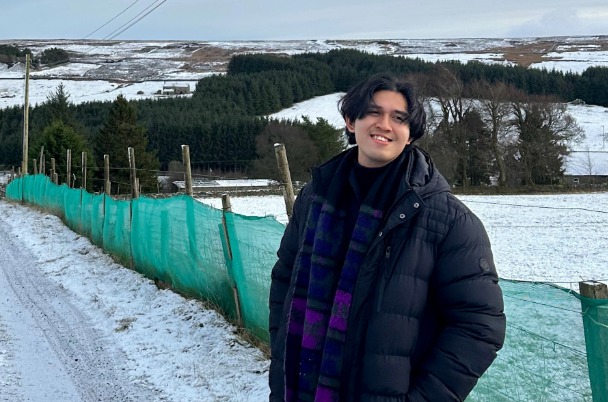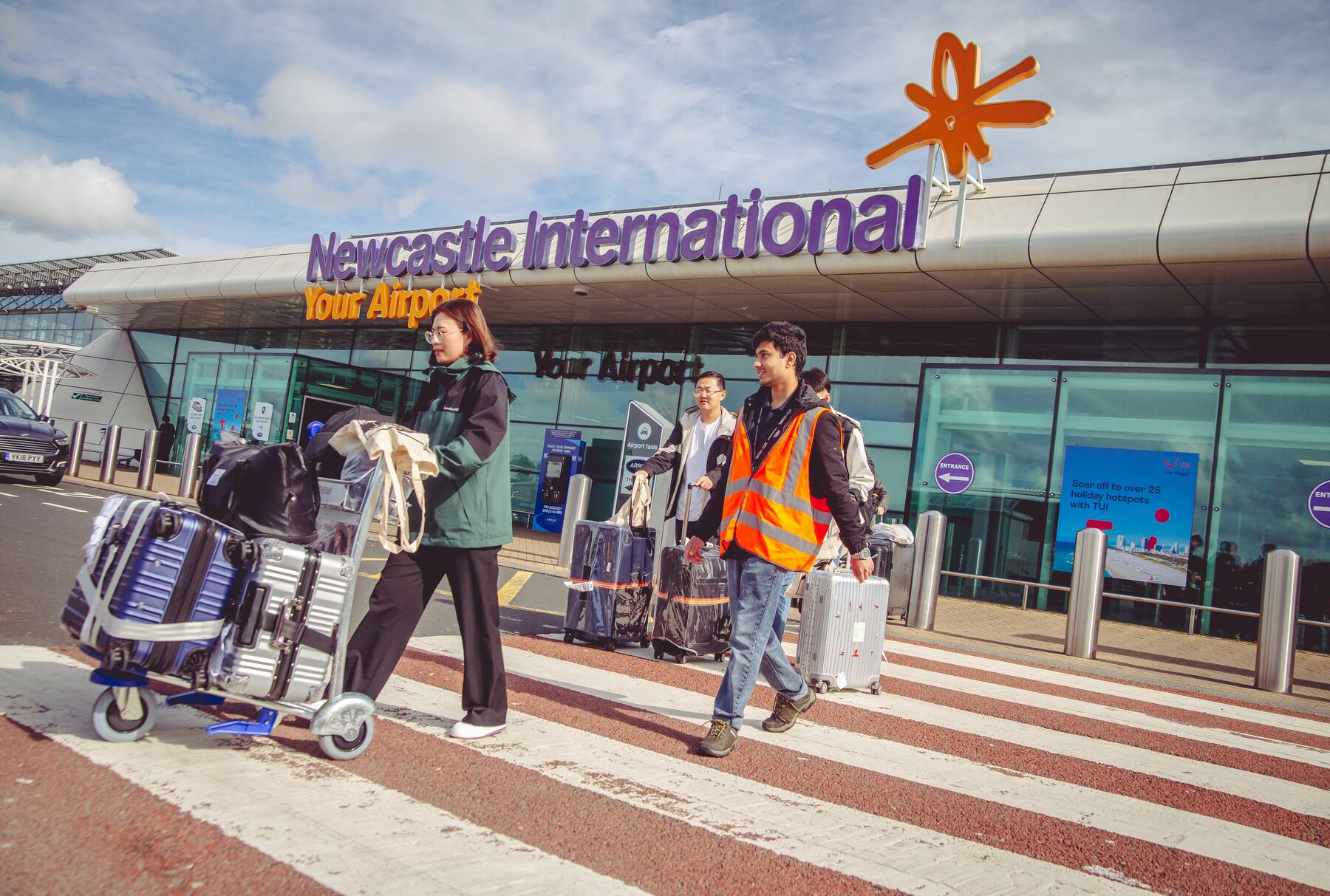Harith Zulfikree
Read Harith's profile showing how much he loved his time in Newcastle!
Name: Harith Syahmie Bin Zulfikree
Course: BSc (Hons) Biomedical Sciences, MRes Medical and Molecular Biosciences
Year of graduation: 2024 (BSc); 2025 (MRes)
Current role, organisation and industry: MRC DiMeN DTP PhD student at The University of Sheffield
Home country: Malaysia
Why did you choose to study at Newcastle University?
I’ve always been fascinated by biology, particularly in understanding how the body works, how diseases develop, and how this knowledge can be applied to devise effective treatments. The 2+1 BSc (Hons) Biomedical Sciences programme at Newcastle University Medicine Malaysia (NUMed) immediately stood out to me for its unique structure: two years in Malaysia followed by a final year at the Newcastle University (NCL) UK campus. This gradual transition was perfect for someone like me who had never lived away from home, giving me time to adapt to university life while preparing financially for a quality experience in the UK.
Studying at NUMed also meant benefiting from NCL’s strong academic reputation while enjoying the familiarity of a local setting before moving abroad. My final year in the UK was an enriching cultural experience. I built friendships and networks with people from around the world while learning in a world-class research environment. My positive undergraduate experience inspired me to stay on for an MRes in Medical and Molecular Biosciences, specialising in cancer biology and therapeutics, where I honed my research skills in preparation for my next step: embarking on a PhD.

What did/do you love about Newcastle University?
I absolutely loved my time at NCL: from the exceptional academic experience and unwavering support, to the vibrant student life and the unique charm of the “Toon” itself. I was fortunate to have dedicated personal tutors and supportive staff at both the NUMed Malaysia and NCL UK campuses, who constantly encouraged me to thrive.
One of my favourite aspects was meeting and building friendships with people from all over the world – I now have friends from over 30 countries! I also enjoyed joining the “Give It A Go” activities organised by the Newcastle University Students’ Union (NUSU), which gave me the perfect opportunity to explore not just Newcastle, but also the breathtaking coastlines, countrysides, and hidden gems across Northumberland and the Northeast of England, all at affordable student prices!
Newcastle itself is a wonderful place to live and study. The cost of living is generally more affordable compared to many other UK cities, and the campus’s central location makes it easy to enjoy the city’s vibrant and welcoming atmosphere. I fell in love with the architecture – a beautiful blend of historic buildings and modern facilities – something that sets Newcastle apart from more urbanised campuses. As a Muslim, I also felt well-supported. There’s a wide range of halal food and grocery options nearby, and the campus is equipped with excellent facilities such as a mosque, silent and prayer rooms, ablution areas, and even halal options in cafeterias. The NUSU Co-op also conveniently sells halal products, making day-to-day student life so much easier for me!
What did you enjoy most (or least!) about your course?
Overall, I enjoyed every aspect of both my BSc and MRes programmes. What stood out most, however, was the incredible opportunity to gain hands-on research experience in established laboratories at the forefront of biomedical science. During my BSc, I was based at the Wellcome Centre for Mitochondrial Research, and in my MRes, I joined the Drug Discovery Unit at the Newcastle University Centre for Cancer. Working alongside esteemed researchers in these environments was both inspiring and motivating. I not only enjoyed immersing myself in my own projects, but also found it enriching to learn about the diverse and exciting research being carried out in cancer biology and other related fields.
Tell us a little bit about career journey. How did you get into what you do now?
From the start, I’ve always wanted to be an academician, with a PhD as an essential step before entering the profession. While I was offered a place at a top research university in Malaysia, I chose NCL for its global exposure and diverse academic community. Learning from experts worldwide broadened my perspective, refined my research approach, and equipped me with expertise I aspire to bring back to Malaysia to contribute to its research landscape.
My passion for cancer biology, shaped by both scientific curiosity and personal experience supporting my mother through breast and colorectal cancer, fuelled my academic journey. In my BSc, I investigated how mitochondrial dysfunction influences the tumour immune microenvironment in colorectal cancer, graduating with First Class Honours. Although my initial PhD applications in the UK were unsuccessful, I pursued an MRes in Medical and Molecular Biosciences at NCL, specialising in cancer biology and therapeutics while continuing to apply. My MRes research investigated drug resistance in breast cancer, using pre-clinical models of Palbociclib-resistant cell lines to elucidate CDK4/6-inhibitor resistance.
This persistence paid off when I secured a place on the prestigious MRC Discovery Medicine North Doctoral Training Partnership (MRC DiMeN DTP). Beginning in October 2025 at The University of Sheffield, my PhD will explore novel anti-cancer drug delivery using tissue-engineered cancer and mass spectrometry imaging, focusing on oropharyngeal squamous cell carcinoma, uniting my previously developed skills, while opening new frontiers for me in cancer research.
What do you enjoy most about your current job?
While I haven’t yet started my PhD, I’m incredibly excited about the opportunity to apply the skills and knowledge I’ve gained throughout my BSc and MRes at NCL. In my current role as an MRes student, I particularly enjoy learning new laboratory techniques, analysing data, and uncovering the story that the results reveal. My time at NCL, especially during the MRes, has shaped me into a confident young researcher and strengthened my passion for exploring new avenues in understanding the complexity of diseases like cancer. Ultimately, what I enjoy most is knowing that each experiment, analysis, and discovery brings us a step closer to improving therapeutic interventions for patients.
What is the biggest challenge you have faced in your career journey?
Securing a fully funded PhD in the UK as an international student was one of the greatest challenges of my career journey. The competition was intense, and I faced multiple rejections before succeeding. Each setback tested my resilience and self-belief, but with the continuous support of my academic mentors and tutors from NUMed and NCL, and my family, I kept refining my applications and pushing forward. That persistence paid off when I was awarded the MRC DiMeN DTP studentship for my PhD – proof that while it is challenging, it is never impossible. As the Malay proverb goes, “Genggam bara api, biar sampai menjadi arang” – literally, “Clench a burning ember until it turns to coal,” meaning to persevere through hardship until the goal is achieved.
How did your course and experiences at Newcastle University prepare you for your current role?
My time at NCL gave me a solid foundation for my PhD journey, combining rigorous academic training with hands-on research in state-of-the-art facilities. I harnessed advanced lab techniques, sharpened my ability to analyse complex datasets, and gained real-world insight into biomedical research. Collaborating with leading researchers and engaging with experts from around the world exposed me to diverse perspectives, training styles, and working cultures, broadening my thinking and shaping my professional maturity. These experiences not only strengthened my technical expertise but also built resilience, adaptability, and the confidence to tackle challenging scientific questions head-on.
What other things did you do at University which helped you to get where you are now?
During my first and second years of my BSc, I voluntarily took on two summer research internships at Universiti Teknologi Malaysia (UTM) – one in nutraceutical sciences at the Institute of Bioproduct Development and another in cardiovascular engineering at the IJN–UTM Cardiovascular Engineering Centre. In the first one, I evaluated the phytochemical and antioxidant profiles of Artocarpus altilis; in the second one, I assessed the in vitro biocompatibility of electrospun composite nanofiber membranes for cardiovascular patches used for wound dressing post-cardiac surgery. These projects not only gave me transferable lab skills and prepared me for my final-year project, but also allowed me to collaborate with researchers, postgraduate students, clinicians, and academics. A standout outcome was co-authoring two research papers as an undergraduate – an uncommon achievement that strengthened my academic profile and set me apart when applying for a fully funded PhD.
What one piece of advice do you wish someone had given you when you first started?
Network early and often – don’t wait. If you’re interested in someone’s research, reach out right away. In academia, opportunities can be gone in a blink of an eye, and the “someone else” who gets there first could have been you. During my time at Newcastle, I found that academic staff were always welcoming, supportive, and happy to share their work with anyone who showed genuine interest. Those conversations can open doors you didn’t even know existed.
What support do you wish you had when you first started? And are there any resources that you would recommend to people?
I wish I had made the most of the University’s Career Services from the very beginning. They offer far more than people realise: from reviewing CVs and résumés, to running mock interviews, to providing tailored career advice that can help you clarify your goals and take confident steps towards them. For those aspiring to academia, additional structured support would be incredibly valuable, particularly in creating opportunities for undergraduates to co-publish papers. I was fortunate to gain this experience during two eight-week research internships at UTM, where I contributed to two publications – an opportunity I had also hoped to find at NCL, but which wasn’t available to me at the time. More opportunities like these can be transformative, and prioritising them for students who are serious about an academic career could help bridge the gap between aspiration and achievement.
